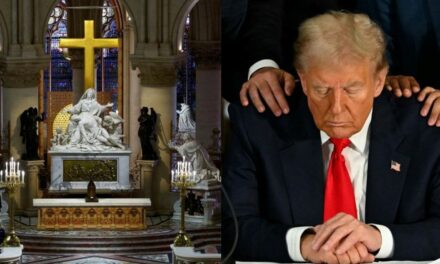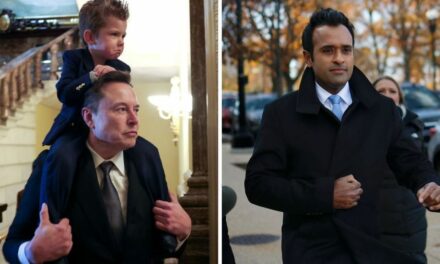We support our Publishers and Content Creators. You can view this story on their website by CLICKING HERE.

Now that Donald Trump has successfully mounted his political comeback and is set to become the 47th president of the United States, we can finally look forward to seeing how he’ll handle his long list of agenda items for his upcoming administration: inflation, immigration, energy, crime.
He’s got his hands full.
Both Israel and Turkey are aligned when it comes to sending money and arms to Azerbaijan for the express purpose of whittling the already-tiny Republic of Armenia down to nothing.
But for now, let’s focus on his foreign policy — particularly how he’s going to tackle the increasingly complicated situation developing in Israel and the rest of the Middle East.
Good guys vs. bad guys
Trump has come out firmly in support of Israel in the state’s crusade against Hamas, Hezbollah, Iran, and the rest of Iran’s proxy terrorist network. But the rhetoric that’s come from both Trump and Israeli Prime Minister Benjamin Netanyahu oversimplifies the situation.
America and Israel are the good guys.
Iran, Hamas, and Hezbollah are the bad guys.
That’s been the framing of the situation from GOP establishmentarians. Simple, yet effective.
But it’s nowhere near as simple as that, and Trump’s recent moves have actually complicated his commitment to that framing as well.
You see, the Middle East is, in reality, a smorgasbord of shifting, overlapping, crisscrossing alliances. And that’s because there is so much ethnic and religious diversity within this pocket of the world.
No Muslim monolith
Contrary to common Western perception, the Middle East is not one big, brown, Muslim monolith. The Turks are not the Sunni Arabs, who aren’t the Shiite Persians, who aren’t the Christian Armenians, who aren’t the somewhat secular, somewhat Islamic Azeris, who aren’t the Maronite Lebanese, who aren’t the Coptic Egyptians.
Each one of these groups vary drastically from one another in ethnicity, culture, and religion. And therefore, there’s no clear-cut demarcation in the Middle East when it comes to political alliances. Or at least, there’s not a simple “good guys vs. bad guys” heuristic that can be used to assess the situation.
And yet, that’s the framing American foreign policy and media sticks with: “The Middle East is full of Muslim bad guys (who are all the same), and we need to protect the lone Judeo-Christian oasis of democracy in the Middle East.”
Our once and future president did something recently that slightly undermined the legitimacy of that framing.
Trump gets Armenia-pilled
In the days leading up to his election, Trump announced his commitment to aiding Christians in the Middle East who had been victims of Islamic persecution. Specifically, he was referring to the 120,000 Armenians who had been ethnically cleansed from their historic homeland of Artsakh by Azerbaijan.
He even went so far as calling the patriarch of the Armenian Apostolic Church, his holiness Aram I, about mobilizing an Armenian restoration of Artsakh.
From where I’m sitting, this is a clear result of Trump having surrounded himself with advisors like Robert F Kennedy Jr., Vivek Ramaswamy, and Tulsi Gabbard, all of whom have all made statements signaling their support for Armenia against its various regional antagonists.
But the simple act of signaling a commitment to aiding the Christian Armenians actually creates a flurry of complications for the Trump administration.
And it all has to do with the love triangle between the U.S., Israel, and Turkey.
Aiding Azerbaijan
As the entire world knows, Israel launched a war in Gaza after the brutal October 7 attacks by Hamas.
What much of the world doesn’t know is that at the time of the attacks, Israel was already embroiled in a different conflict, aiding (along with the U.S. State Department) in its ethnic cleansing campaign against the Armenian enclave of Artsakh.
And just one week after the October 7 attacks, a shipment of arms left Tel Aviv headed toward Baku, Azerbaijan.
And Israel has not relented. In the midst of all the bombs Israel has dropped on both Gaza and Lebanon, it (along with Turkey) continues to send state-of-the-art weaponry to Azerbaijan, most recently on September 24.
If you’ve kept up with the news, you also know that there’s been a fair bit of saber-rattling between Turkey and Israel, as Turkish President Erdogan has been raising tensions with Israel for its offensive against Hamas, recently going so far as hailing the ICC decision to issue arrest warrants for Israeli leaders as “courageous” and hosting Hamas in Turkey after the terrorist group was booted from Qatar.
It certainly seems like the Islamic Turks are egging on a war with Israel from the outside.
But how much of this is theater?
After all, Israel relies on Turkey and Azerbaijan for 40% of its oil via the BTC Pipeline (which begins in Baku and ends in Ceyhan, Turkey).
And, as I already mentioned, both Israel and Turkey are aligned when it comes to sending money and arms to Azerbaijan for the express purpose of whittling the already-tiny Republic of Armenia down to nothing.
But that still doesn’t cover the total extent of Israel’s antagonistic relationship with Armenians.
Jerusalem land-grab?
You see, the state of Israel isn’t just home to Jews and Muslims. It’s home to about 187,000 Christians, some 5,000 of whom are Armenian. In Jerusalem, the Old City has historically been divided into four quarters: the Christian quarter, Jewish quarter, Muslim quarter, and the Armenian quarter.
While this Armenian community dates back to the 4th century, it has recently found itself under siege by a shadowy Israeli corporation called Xana Capital. In dispute is the “Cow’s Garden,” the last large, open space in Jerusalem’s Old City. In 2021, the Armenian patriarchate agreed to a secret 98-year lease of the land — which comprises 25% of the Armenian quarter, to a Jewish-Australian developer.
Calling the lease illegal, the community has been fighting to invalidate it in court. Meanwhile, the Grayzone reports that Xana Capital has employed Israeli settlers to intimidate Armenians into vacating the land.
The point I’m making is that the framing of the Israel-Palestine conflict since the 10/7 attacks has been that Israel has been in a fight for its survival against the bloodthirsty Muslims and therefore needs as much aid and support from the U.S. as it can muster.
But there’s one glaring flaw in that narrative: Israel’s direct involvement in the downfall of the Armenian state and diaspora.
To recap:
Israel has been sending arms to Azerbaijan, before, during, and after October 7.
Israel is currently confiscating the historic Armenian quarter of Jerusalem.
All of this is happening in the midst of its crusade against Hamas and Hezbollah.
My question is: When is the United States going to prioritize Christians in the Middle East priority over the other two Abrahamic faiths? We’re a Christian country, right?
Help wanted
This is why Trump’s pre-election commitments to Christians in the Middle East is a complicated matter. It’s not as simple as “Muslims bad, Israel good.”
As I mentioned, Trump seems to be stacking his cabinet with pro-Armenia advocates (RFK Jr., Vivek, Tulsi, even Marco Rubio). But he’s also got plenty of pro-Israel people (Elise Stefanik, Kristi Noem, Lee Zeldin, Mike Huckabee, Susie Wiles, Pete Hegseth, and, yes, even Marco Rubio) in the mix. Not to mention the pro-Turkey Dr. Oz as head of Medicare and Medicaid.
So for now, it looks like it’ll be a bumpy ride.
In a post-election interview with Tucker Carlson, RFK, Jr. recounted the time he witnessed Trump draw from memory an accurate map of the Middle East, including troop strength of each country. It’s apparent from this one exchange that Trump has a sharp understanding of the geopolitical and strategic military dynamics of the Middle East.
This means he also knows that stability in the region can never be taken for granted. I would urge him to look at the movements happening between Israel, Turkey, and Azerbaijan and take stock of the Pan-Turanic vision being cooked up by these parties.
If he’s serious about helping the Christians of the Middle East, there’s no getting around it.

 Conservative
Conservative  Search
Search Trending
Trending Current News
Current News 







